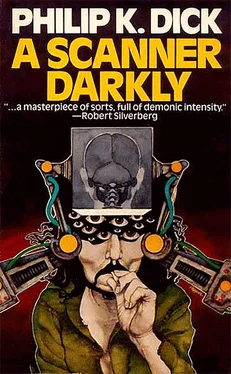Anyhow, Bob Arctor thought, we won’t have to keep sweeping aphids out of the house after Jenny’s been by to visit. He felt like laughing, thinking about it; they had, once, invented a routine—mostly Luckman had, because he was good at that, funny and clever—about a psychiatric explanation for Jerry’s aphid trip. It had to do, naturally, with Jerry Fabin as a small child. Jerry Fabin, see, comes home from first grade one day, with his little books under his arm, whistling merrily, and there, sitting in the dining room beside his mother, is this great aphid, about four feet high. His mother is gazing at it fondly.
“What’s happening?” little Jerry Fabin inquires.
“This here is your older brother,” his mother says, “who you’ve never met before. He’s come to live with us. I like him better than you. He can do a lot of things you can’t.”
And from then on, Jenny Fabin’s mother and father continually compare him unfavorably with his older brother, who is an aphid. As the two of them grow up, Jerry progressively gets more and more of an inferiority complex—naturally. After high school his brother receives a scholarship to college, while Jerry goes to work in a gas station. After that this brother the aphid becomes a famous doctor or scientist; he wins the Nobel Prize; Jerry’s still notating tires at the gas station, earning a dollar-fifty an hour. His mother and father never cease reminding him of this. They keep saying, “If only you could have turned out like your brother.”
Finally Jerry runs away from home. But he still subconsciously believes aphids to be superior to him. At first he imagines he is safe, but then he starts seeing aphids everywhere in his hair and around the house, because his inferiority complex has turned into some kind of sexual guilt, and the aphids are a punishment he inflicts on himself, etc.
It did not seem funny now. Now that Jerry had been lugged off in the middle of the night at the request of his own friends. They themselves, all of them present with Jerry that night, had decided to do it; it couldn’t be either postponed or avoided. Jerry, that night, had piled every goddamn object in his house against the front door, like maybe nine hundred pounds of assorted crap, including couches and chairs and the refrigerator and TV set, and then told everybody that a giant superintelligent aphid from another planet was out there preparing to break in and git him. And more would be landing later on, even if he got this one. These extraterrestrial aphids were smarter by fan than any humans, and would come directly through the walls if necessary, revealing their actual secret powers in such ways. To save himself as long as possible, he had to flood the house with cyanide gas, which he was prepared to do. How was he prepared to do this? He had already taped all the windows and doors airtight. He then proposed to turn on the water faucets in the kitchen and bathroom, flooding the house, saying that the hot-water tank in the garage was filled with cyanide, not water. He had known this for a long time and was saving it for last, as a final defense. They would all die themselves, but at least it would keep the super-intelligent aphids out.
His friends phoned the police, and the police broke down the front door and dragged Jerry off to the N.A. Clinic. The last thing Jerry said to them all was “Bring my things later on—bring my new jacket with the beads on the back.” He had just bought it. He liked it a lot. It was about all he liked any more; he considered everything else he owned contaminated.
No, Bob Arctor thought, it doesn’t seem funny now, and he wondered why it ever had. Maybe it had stemmed from fear, the dreadful fear they had all felt during the last weeks being around Jerry. Sometimes in the night, Jerry had told them, he prowled his house with a shotgun, sensing the presence of an enemy. Preparing to shoot first, before being shot. That is, both of them.
And now, Bob Arctor thought, I’ve got an enemy. Or anyhow I’ve come onto his trail: signs of him. Another slushed creep in his final stages, like Jerry. And when the final stages of that shit hits, he thought, it really does hit. Better than any special Ford or GM ever sponsored on primetime TV.
A knock at his bedroom door.
Touching the gun beneath his pillow, he said, “Yeah?”
Mubble-mubble . Barris’s voice.
“Come in,” Arctor said. He reached to snap on a bedside lamp.
Barris entered, eyes twinkling. “Still awake?”
“A dream woke me,” Arctor said. “A religious dream. In it there was this huge clap of thunder, and all of a sudden the heavens rolled aside and God appeared and His voice rumbled at me—what the hell did He say?—oh yeah. ‘I am vexed with you, my son,’ He said. He was scowling. I was shaking, in the dream, and looking up, and I said, ‘What’d I do now, Lord?’ And He said, ‘You left the cap off the toothpaste tube again.’ And then I realized it was my exwife.”
Seating himself, Barris placed a hand on each of his leather-covered knees, smoothed himself, shook his head, and confronted Arctor. He seemed in an extremely good mood. “Well,” he said briskly, “I’ve got an initial theoretical view as to who might have systematically damaged with malice your cephscope and may do it again.”
“If you’re going to say it was Luckman—”
“Listen,” Barris said, rocking back and forth in agitation. “W-w-what if I told you I’ve anticipated for weeks a serious malfunction in one of the household appliances, especially an expensive one difficult to repair? My theory called for this to happen! This is a confirmation of my over-all theory!”
Arctor eyed him.
Slowly sinking back down, Barris resumed his calm and bright smiling. “You,” he said, pointing.
“You think I did it,” Arctor said. “Screwed up my own cephscope, with no insurance.” Disgust and rage swelled through him. And it was late at night; he needed his sleep.
“No, no,” Barris said rapidly, looking distressed. “You are looking at the person who did it. Buggered your cephscope. That was my complete intended statement, which I was not allowed to utter.”
“You did it?” Mystified, he stared at Barris, whose eyes were murky with a sort of dim triumph. “Why?”
“I mean, it’s my theory that I did it,” Barris said. “Under posthypnotic suggestion, evidently. With an amnesia block so I wouldn’t remember.” He began to laugh.
“Later,” Arctor said, and snapped off his bedside lamp. “Much later.”
Barris rose, dithering. “Hey, but don’t you see—I’ve got the advanced specialized electronic technical skills, and I have access to it—I live here. What I can’t figure out, though, is my motive.”
“You did it because you’re nuts,” Arctor said.
“Maybe I was hired by secret forces,” Barris muttered in perplexity. “But what would their motives be? Possibly to start suspicion and trouble among us, to cause dissension to break out, causing us to be pitted against one another, all of us, uncertain of whom we can trust, who is our enemy and like that.”
“Then they’ve succeeded,” Arctor said.
“But why would they want to do that?” Barris was saying as he moved toward the door; his hands flapped urgently. “So much trouble—removing that plate on the bottom, getting a passkey to the front door—”
I’ll be glad, Bob Arctor thought, when we get in the holoscanners and have them set up all over this house. He touched his gun, felt reassured, then wondered if he should make certain it was still full of shells. But then, he realized, I’ll wonder if the firing pin is gone or if the powder has been removed from the shells and so forth, on and on, obsessively, like a little boy counting cracks in the sidewalk to reduce his fear. Little Bobby Arctor, coming home from the first grade with his little schoolbooks, frightened at the unknown lying ahead.
Читать дальше








